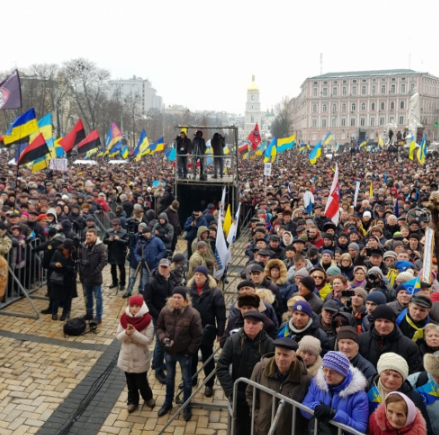This Sunday, on 18 February 2018, Saakashvili’s supporters in Ukraine held yet another march in support of the leader of the Rukh Novykh Syl Party and ex-President of Georgia Mikheil Saakashvili. This time, it was without Saakashvili, who was expelled from Ukraine to Poland last week, from where he traveled to The Netherlands and has made an appearance at the Munich Security Conference.
The march, titled “All-Ukrainian march for the future,” took place in Kyiv. It gathered from 3,000 (police’s version) to 10,000 (organizers’ version) participants. The timing of the march coincided with the fourth anniversary of the deadliest days of the Euromaidan revolution, when over a hundred protesters were shot by the riot police. Also like four years ago, metro stations in central Kyiv were closed around the announced time of the start of the march due to a purported bomb threat. In 2013-2014, artificially created problems with public transportation were one of the methods with which the state attempted to supress Euromaidan protests. Whether the bomb threat on Sunday was real or not, it succeeded in attracting additional attention to the protest.
David Sakvrelidze, the former deputy of the Prosecutor General and now Saakashvili’s colleague in Rukh Novykh Syl, posted photos of similar marches taking place in other Ukrainian cities.
At the stage on Mykhailivska Ploshcha, David Sakvarelidze, the civic activist Olha Halabala, and MP Yuriy Derevianko read aloud a resolution, which called upon President Poroshenko to resign and hold snap elections. The new parliament, according to the speakers, should adopt legislation which will change the state system.
“We will elect a transitional parliament for one year. It will consist of 300 people who will adopt the necessary laws and changes to the Constitution,” the resolution noted. As well, it mentions creating an anti-crisis government.
The resolution calls to create civic resistance committees and “direct action groups.” The latter, it was announced, will “pressure Poroshenko’s supporters in a civilized manner, picket MPs and judges, demanding their resignation and the resignation of Poroshenko.”
Meanwhile, the committee representatives, according to Yuriy Derevianenko, will draft lists “which should eventually become a sanction list for the people who have robbed the whole country,” and be engaged in the preparation of a new protest march, which will take place not only in the Oblast centers like on Sunday, but in smaller cities as well, demanding Poroshenko’s impeachment.
Saakashvili, a former Odesa governor, was once Poroshenko’s ally turned into his fiercest critic. In the afternoon of 12 February, Saakashvili was arrested by armed uniformed men in a restaurant in Kyiv, placed on a plane, and flown off to Poland, from where he illegally entered Ukraine following being illegally stripped of his Ukrainian citizenship.
Saakashvili is wanted by the Georgian government on multiple criminal charges, which he says are politically motivated. On 5 January 2018, a judge in Georgia sentenced the ex-Georgian president in absentia to three years in prison.
Saakashvili’s Rukh Novykh Syl has been organizing marches calling for Poroshenko’s resignation during autumn 2017. Sukh Novykh Syl supportesr are also currently camping near the Ukrainian parliament.
Read also:
- Ukraine deports Georgian ex-President Saakashvili to Poland
- The Saakashvili saga — folly and disrespect for the rule of law
- Georgia’s sentence against Saakashvili: restoration of justice or political persecution?
- Saakashvili in Ukraine: revolutionary, Kremlin agent, or Poroshenko’s project?
- Poroshenko strips “old buddy” Saakashvili of citizenship; Ukraine returning to selective justice
- Saakashvili enters Ukraine after fans storm border crossing
- Georgian ex-President Saakashvili detained in Kyiv
- UPDATING: Saakashvili detained in Kyiv for “supporting criminal organizations”
- Prosecutor General accuses Saakashvili in cooperating with pro-Russian oligarch, latter calls for protests
- Sunday Saakashvili rally attempted to seize palace in Kyiv, 32 law enforcers hospitalized












